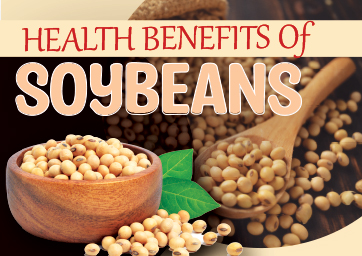What are Soybeans?
Soybeans are legumes (a type of bean)and are among the oldest cultivated crops in the world. They are commonly eaten either as whole beans or ground into flour. Ground soybeans are called "tofu."
The health benefits of soy can be found in many processed foods, including bread, crackers, chips, cookies, and meat substitutes. People in some countries also use Soybean cooking oil.
Types of Soybeans
There are two types of soybeans: dry beans and green soybeans. Dry beans are harvested at full maturity, while green soybeans are still tender and immature.
● Dry Soybeans
The most common soybean variety is the dry bean, harvested at full maturity. Other varieties of dry beans include black soybeans, brown soybeans, lima beans, mung beans, navy beans, pinto beans, red kidney beans, and yellow soybeans.
● Green Soybeans
Green soybeans are harvested before they turn mature. They are sometimes called edamame or Japanese soybeans.
Nutritional Value of Soybeans
Soybeans are high in protein. They are super rich in fiber but low in fat. One cup of cooked soybeans provides about 8 grams of dietary fiber and 2 grams of fat. They also contain a good amount of iron, zinc, copper, manganese, and vitamins B1, B2, & E.
Here are some soybean nutrition facts:
• One cup of cooked soybeans contains about 25 grams of protein.
• One cup of raw soybeans contains approximately 6 grams of fiber.
• One cup contains 20 milligrams of iron, 90% of the recommended intake of zinc, copper, and manganese, and 40% of the recommended amount of iodine.
13 Health Benefits of Soybeans
Now that we know about soybeans' nutrition let's explore its health benefits.

1. Soybeans Are Packed with Healthy Protein
Soybeans are a nutritional powerhouse, offering a range of health benefits worth exploring. For starters, soybeans are a complete protein, containing all the essential amino acids your body needs. They're also packed with fiber, iron, magnesium, and potassium.
2. Soybeans Are Great For Your Heart
Soybeans should be a part of your diet if you're looking for ways to improve your heart health. Healthy omega-3 fatty acids, which have been shown to lower the risk of heart disease, are abundant in soybeans.
Soybeans are also low in calories and cholesterol-free, making them a healthy choice for people with blood pressure and heart problems.
3. Soybeans Can Help You Lose Weight
Soybeans are low in calories and high in fiber, which makes them the perfect food if you're trying to lose weight. They'll keep you feeling full and prevent you from overeating. Soybeans also contain healthy fats, which can help boost your metabolism and encourage weight loss.
4. Soybeans Can Improve Your Bone Health
Imagine if there was a food that could help improve your bone health. Wouldn't that be amazing? Well, believe it or not, soybeans can do just that.
Soybeans contain essential nutrients for strong bones, including calcium, magnesium, and phosphorus. They also contain isoflavones and plant-based estrogens that can help protect against osteoporosis.
5. Soybeans May Reduce the Risk of Cancer
Soybeans contain isoflavones, which are plant estrogens. And these isoflavones can help block the effects of cancer-causing substances, and they also have anti-inflammatory properties.
6. Soybeans Can Help Regulate Blood Sugar Levels
As one of the foods with the lowest glycemic index, soybeans prevent a sharp rise or dip in blood sugar levels.
They have isoflavones, a class of phytoestrogen, in them. The body can utilize glucose more effectively with the aid of isoflavones. This helps maintain steady blood sugar levels and avoid spikes and dips.
7. Soybeans Can Boost Brain Function
That's right; soybeans are a great source of essential fatty acids that promote cognitive health. So soybeans should be on your list if you're looking for food that can help keep your brain sharp.
8. Soybeans Can Improve Skin Health
Soybeans are full of vitamin C, an essential nutrient for skin health. Vitamin C protects skin from the sun's harmful UV rays and helps repair damaged skin cells.
Plus, soybeans are a good source of antioxidants, which help to protect your skin from free radicals. Unchecked free radicals damage your skin cells, leading to premature aging.
9. Soybeans Improve Your Mood
Eating soybeans regularly may help improve your mood. Eating soybeans may improve your mood because they contain tryptophan, an amino acid that helps produce serotonin, a neurotransmitter associated with happiness and calmness.
10. Reduce Menopause Symptoms
Many women experience menopausal symptoms, including hot flashes and night sweats. Soy beans contain genistein, a type of phytoestrogen, which may decrease estrogen production in the body. Because soybeans contain less estrogen than meat does, they may provide relief for menopausal symptoms.
11. Soybeans are Gluten-free
Gluten gives grains their elasticity and makes them sticky. This quality is desirable for making bread and pasta but not necessarily good for people who have sensitivities to gluten. People with celiac disease cannot digest gluten at all, while those with non-celiac gluten sensitivity may experience bloating, gas, and diarrhea after consuming gluten.
12. Soybeans are Hypoallergenic
In addition to being gluten-free, soybeans are hypoallergenic. Hypoallergy means they don't cause allergic reactions. People with allergies tend to react negatively to foods they're allergic to, including soybeans. So soybeans may be a good option if you're looking to avoid allergens.
13. Soybeans Can Improve Gut Health
Soybeans are packed with fiber, which promotes regularity and keeps your gut bacteria healthy.
That's not all, though. Additionally, oligosaccharides, a type of carbohydrate, are found in soybeans. Because oligosaccharides work as prebiotics, they feed the good bacteria in your gut and support its health.



 Contact Us
Contact Us






 Hospitals
Hospitals
 Doctors
Doctors
 Diagnostic
Diagnostic
 Pharmacy
Pharmacy
 Health Tips
Health Tips
 Blog
Blog



















Comments